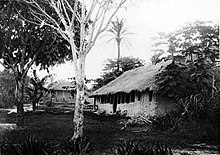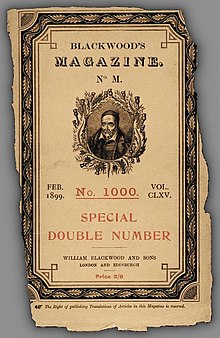Plot summary
Aboard the Nellie, anchored in the River Thames near Gravesend, England, Charles Marlow tells his fellow sailors about the events that led to his appointment as captain of a river steamboat for an ivory trading company. As a child, Marlow had been fascinated by "the blank spaces" on maps, particularly by the biggest, which by the time he had grown up was no longer blank but turned into "a place of darkness" (Conrad 10). Yet there remained a big river, "resembling an immense snake uncoiled, with its head in the sea, its body at rest curving afar over a vast country and its tail lost in the depths of the land" (Conrad 10). The image of this river on the map fascinated Marlow "as a snake would a bird" (Conrad 10). Feeling as though "instead of going to the centre of a continent I were about to set off for the centre of the earth", Marlow takes passage on a French steamer bound for the African coast and then into the interior (Conrad 18). After more than thirty days the ship anchors off the seat of the government near the mouth of the big river. Marlow, still some two hundred miles to go, now takes passage on a little sea-going steamer captained by a Swede. He departs some thirty miles up the river where his Company's station is. Work on the railway is going on, involving removal of rocks with explosives. Marlow enters a narrow ravine to stroll in the shade under the trees, and finds himself in "the gloomy circle of some Inferno": the place is full of diseased Africans who worked on the railroad and now await their deaths, their sickened bodies already as thin as air (Conrad 24-25). Marlow witnesses the scene "horror-struck" (Conrad 26).Marlow has to wait for ten days in the Company's Outer Station, where he sleeps in a hut. At this station, which strikes Marlow as a scene of devastation, he meets the Company's impeccably dressed chief accountant who tells him of a Mr. Kurtz, who is in charge of a very important trading-post, and a widely respected, first-class agent, a "'very remarkable person'" who "'Sends in as much ivory as all the others put together'" (Conrad 28). The agent predicts that Kurtz will go very far: "'He will be a somebody in the Administration before long. They, above—the Council in Europe, you know—mean him to be'" (Conrad 29).
Old Belgian river station on the Congo River, 1889
Marlow is frustrated by the months it takes to perform the necessary repairs, made all the slower by the lack of proper tools and replacement parts at the station. During this time, he learns that Kurtz is far from admired, but more or less resented (mostly by the manager).
Once underway, the journey up-river to Kurtz's station takes two months to the day. The steamboat stops briefly near an abandoned hut on the riverbank, where Marlow finds a pile of wood and a note indicating that the wood is for them and that they should proceed quickly but with caution as they near the Inner Station.
The Roi des Belges ("King of the Belgians"—French), the Belgian riverboat Conrad commanded on the upper Congo, 1889
At Kurtz's station Marlow sees a man on the riverbank waving his arm, urging them to land. The pilgrims, heavily armed, escort the manager on to the shore to retrieve Mr. Kurtz. The man from the bank boards the steamboat, and turns out to be a Russian wanderer who had happened to stray into Kurtz's camp. He explains that he had left the wood and the note at the abandoned hut. Through conversation Marlow discovers just how wanton Kurtz can be; how the natives worship him; and how very ill he has been of late. The Russian admires Kurtz for his intellect and his insights into love, life, and justice, and suggests that he is a poet. He tells of how Kurtz opened his mind, and seems to admire him even for his power—and for his willingness to use it. Marlow, on the other hand, suggests that Kurtz has gone mad.
From the steamboat, Marlow observes the station in detail and is surprised to see near the station house a row of posts topped with the severed heads of natives. Around the corner of the house, the manager appears with the pilgrims, bearing a gaunt and ghost-like Kurtz on an improvised stretcher. The area fills with natives, apparently ready for battle, but Kurtz shouts something from the stretcher, and the natives retreat into the forest. The pilgrims carry Kurtz to the steamer and lay him in one of the cabins, where he and the manager have a private conversation. Marlow watches a beautiful native woman walk in measured steps along the shore and stop next to the steamer. When the manager exits the cabin he pulls Marlow aside and tells him that Kurtz has harmed the Company's business in the region, that his methods are "unsound". Later, the Russian reveals that Kurtz believes the Company wants to remove him from the station and kill him, and Marlow confirms that hangings had been discussed.
Léon Rom, photographed c. 1880, who some have argued served as the inspiration for Kurtz
Kurtz's health worsens on the return trip, and Marlow himself becomes increasingly ill. The steamboat breaks down and, while it is stopped for repairs, Kurtz gives Marlow a packet of papers, including his commissioned report and a photograph, telling him to keep them away from the manager. When Marlow next speaks with him, Kurtz is near death; as he dies, Marlow hears him weakly whisper: "The horror! The horror!" (Conrad 116). A short while later, the "manager's boy" announces to the rest of the crew, in a scathing tone, "Mistah Kurtz—he dead" (Conrad 117). The next day Marlow pays little attention to the pilgrims as they bury "something" in a muddy hole (Conrad 117). He falls very ill, himself near death.
Upon his return to Europe, Marlow is embittered and contemptuous of the "civilised" world. Many callers come to retrieve the papers Kurtz had entrusted to him, but Marlow withholds them or offers papers he knows they have no interest in. He then gives Kurtz's report to a journalist, for publication if he sees fit. Finally Marlow is left with some personal letters and a photograph of Kurtz's fiancée, whom Kurtz referred to as "My Intended" (Conrad 79). When Marlow visits her, she is dressed in black and still deep in mourning, although it has been more than a year since Kurtz's death. She presses Marlow for information, asking him to repeat Kurtz's final words, which in fact are "The horror! The horror!" Uncomfortable, Marlow lies and tells her that Kurtz's final word was her name.






No comments:
Post a Comment